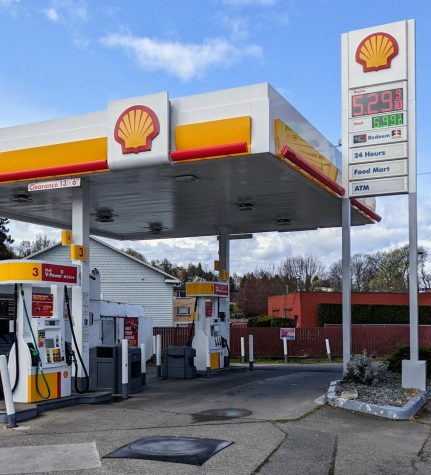Gas gripes
Gas price increase straining student budgets
April 13, 2022

Gas prices spiked across the nation at the beginning of March after President Joe Biden banned Russian oil and gas imports to the U.S., aiming to isolate Russia’s economy.
As the price at the gas pump in America increased anywhere from 75 cents to a dollar, students saw a significant increase in expenses.
The U.S. imports less than 10% of its oil and gas from Russia, so many question why gas prices are rising in the U.S. if the nation doesn’t depend on Russia for fuel. CBS reporter Patrick De Haan said on CBS news that the surge in gas prices is due to the larger global oil market.
“When the U.S. issues sanctions, that has wide ramifications on the ability of Russia to export oil,” De Haan said. “We don’t import a lot, but somebody else does, and we are making it difficult for Russian oil to flow to the global market, and prices are reacting to that.”
As COVID-19 policies began lifting, many resumed commuting, but an increase in gas prices prevented some college students from enjoying the bliss of vehicular freedom.
Second-year theater major Sarah Nguyen shared that her gas costs an extra $20 for a full tank. Nguyen shared that gas prices affect student commuters who live farther from school.
“It definitely hurts our wallet,” Nguyen said. “I’ve been driving more thoughtfully like I’m going from point A to point B, and that’s it. I used to like to drive around to get things off of my mind because I feel like that helps, but I’ve been a lot more, like a lot more, cautious about my driving and how many miles I’m driving.”
Jose Zuniga, a third-year criminal justice major, is a commuting student that shares a similar sentiment.
“I have to put in more gas, and I notice it costs more money,” Zuniga said. “I could tell a big difference between what I used to do before and now. I see myself driving less now and only going where I actually need to go.”
Third-year political science Marissa Limon lives on campus, but she does not want to extend the cost of travel because of gas prices.
“I live on campus, but I have a car,” Limon said. “I tend to try not to use it as much because gas is really expensive, and I don’t wanna pay like that much money for it. I have other things to pay for, so I try to use my car a lot less. I actually haven’t been driving that much.”
The sudden cost in expense challenges students to budget their spending until prices see a decrease. Fourth-year nursing major Evelyn Gutierrez is a student worker at the UNICOM desk, and she agreed that increasing gas prices limited her traveling.
“I’ve been reserved about how much I drive around Seattle because of traffic. I feel like sitting in traffic makes you lose your gas more,” Gutierrez said. “So, I find my way walking to things if I can. Rarely do I use the bus, but I also ask my friends like, ‘hey, do you want to drive instead?'”
Gutierrez highlighted that the gas prices would affect student commuters and suggested students to avoid Shell gas stations. As prices continue to rise, there are still ways students are trying to save money. Gutierrez had suggestions for other commuting students.
“If [students] are commuters coming from farther places, I think they would have to be more gas conscious about everything,” Gutierrez said. “If you could tell people about gas prices, I suggest that they don’t go to Shell, especially the one right next to SPU’s Art Center. Shell has the most expensive price I’ve ever seen. If you go down the street to Safeway, it’s way cheaper for some reason.”

























































































